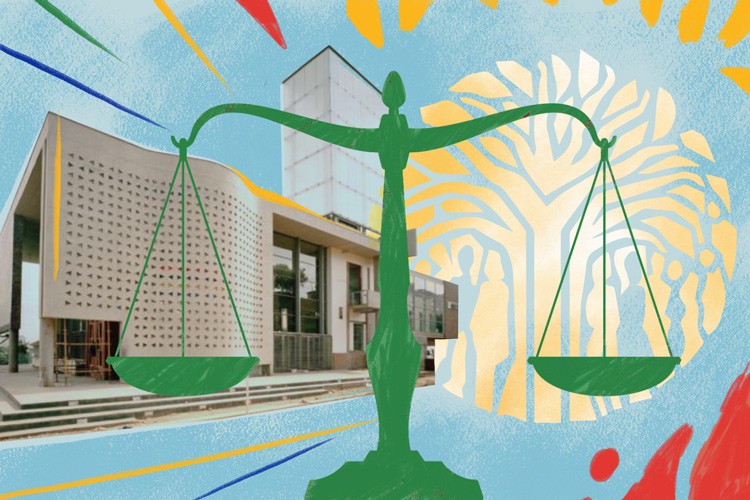Over 230 court judgments are late
The latest report does not list any judgments reserved in the last six months
Hundreds of judgments continue to be delivered late by judges across the country. Illustration: Lisa Nelson
- 236 judgments have been outstanding for at least six months in courts across the country, according to the latest Reserved Judgment Report for the beginning of Term 4 of 2023.
- The Gauteng High Court in Pretoria had the highest number of late judgments, 42, followed by the Pietermaritzburg High Court with 32 and Johannesburg Labour Court with 24.
- Judge Nomsa Khumalo of the Pretoria High Court had the highest number of late judgments with 14 matters outstanding for more than six months.
- Despite retiring in August 2021, Judge Anton van Zyl still has outstanding judgments with two matters dating back to 2012 and 2013.
Some 236 judgments have been outstanding for at least six months in courts across the country.
This is according to the latest Reserved Judgment Report for the Chief Justice as of the beginning of the fourth term of 2023 (2 October or 1 November, depending on the court). In total 1,366 judgments were reserved as of these dates.
The Office of the Chief Justice (OCJ) last released the list of reserved judgments in November 2023. But this only went up to Term 2 of 2023. The lists up to the start of Term 3 and Term 4 were released only this month. In other words there is currently still no public record of the judgments reserved since six months ago.
The judicial norms and standards state that every effort should be made to hand down judgments no later than three months after the last hearing.
GroundUp has been using a more lenient six-month benchmark before regarding a reserved judgment as late. The OCJ has also only listed judgments that have been outstanding for six months or longer.
The number of late judgments dropped from 264 in Term 2 to 213 in Term 3, but then increased to 236 in Term 4.
Of the 236 late judgments, the Pretoria High Court had the highest number of late judgments with 42 matters. This was followed by the Pietermaritzburg High Court with 32 late judgments and the Johannesburg Labour Court with 24 late judgments. Both the Johannesburg High Court and Labour Court had 20 late judgments.
Judge Nomsa Khumalo of the Pretoria High Court had the highest number of late judgments with 14 matters outstanding for longer than six months.
Acting Judge Tessa Le Roux of the Cape Town High Court has eight late judgments. The report noted under “cause of under-reporting” that “these were part-heard matters before an ad hoc Acting Judge that became reserved judgments after the appointment without the knowledge of court staff”. Precisely what this means is unclear.
Judge Robert Lagrange is responsible for all of the seven late judgments at the Cape Town Labour Court.
Although the Thohoyandou High Court in Limpopo only had one late judgment by Judge Frans Kgomo, it had been outstanding since August 2020.
Retired Judge Anton van Zyl still has eight late judgments with two matters dating back to 2012 and 2013. Van Zyl has been reported to the Judicial Conduct Committee for these outstanding judgments. According to the Term 3 report, on 5 February 2023, Van Zyl delivered judgment on five late judgments. But in the most recent list, these judgments are still listed as outstanding. It is unclear why there are inconsistencies.
There were no late judgments in Mthatha High Court, Polokwane High Court, Mbombela High Court, Middelburg High Court and the Land Claims Court.
The Competition Appeal Court and Electoral Court did not have any reserved judgments.
But given that the reporting of reserved judgments is based on an honour system, this does not definitively mean these courts have no reserved or late judgments.
To help hold the judiciary to account, GroundUp has launched a system to track late judgments.
Support independent journalism
Donate using Payfast

Don't miss out on the latest news
We respect your privacy, and promise we won't spam you.
Next: Activists and patients march on Gauteng health department demanding radiation treatment
Previous: Children run a gauntlet of muggings and traffic on the way to school
© 2024 GroundUp. This article is licensed under a Creative Commons Attribution-NoDerivatives 4.0 International License.
You may republish this article, so long as you credit the authors and GroundUp, and do not change the text. Please include a link back to the original article.
We put an invisible pixel in the article so that we can count traffic to republishers. All analytics tools are solely on our servers. We do not give our logs to any third party. Logs are deleted after two weeks. We do not use any IP address identifying information except to count regional traffic. We are solely interested in counting hits, not tracking users. If you republish, please do not delete the invisible pixel.

